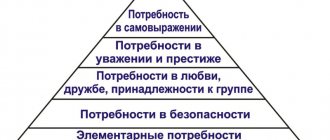Humanistic psychology report. Content
Hence the rejection by scientists of the ideas of psychoanalysis about the hostile relationship between the individual and society.
He also sharply objected to the generally accepted view that development is a person’s adaptation to the world around him. He was one of the first to talk about the uniqueness and individuality of a person, who is the bearer of a unique combination of qualities, which scientists called a trait. He classified these personality traits as basic and instrumental. The main traits are innate and influence behavior, while instrumental ones are formed in the process and shape behavior. A set of these traits, according to Allport, constitutes the core of personality. Allport believed that the autonomy of these traits develops over time. For example, in a child, the traits have not yet been formed and therefore lack their autonomy, but in an adult who is already aware of himself and his individuality, the traits become autonomous and independent of biological needs and social pressure. This autonomy of traits allows a person, while remaining open to society, to preserve his individuality. Thus, Allport solves the identification-alienation problem developed by Maslow. The meaning of humanistic psychology. Its current position in psychology At the moment, there have been trends towards partial integration of humanistic psychology with other directions in psychology - including with its “opponents” - psychoanalysis and neo-behaviorism
But, despite these prerequisites, humanistic psychology occupies an important place in Western psychology and is reflected in the sphere of its practical application. The main area of practical application of humanistic psychology is psychotherapeutic practice
In the works of A. Maslow, K. Rogers, G. Allport and other scientists, ideas about a psychologically healthy personality were developed. The most popular psychotherapeutic systems today were developed by humanist theorists K. Rogers and W. Frankl. Another important area of practical application is humanistic pedagogy, based on the principles of non-directive interaction between teacher and student, and is focused on the formation of the creative abilities of the individual. The third area of practical application of humanistic psychology is socio-psychological training, the creator of which was C. Rogers. Despite all the external signs of an established school, humanistic psychology never became a full-fledged psychological school. This is what the adherents of this trend thought at their meeting in 1985. Subsequent studies confirmed this verdict. To date, less than one percent of textbook material is devoted to the study of humanistic psychology. As a rule, Maslow's hierarchy of needs and Rogers' person-centered therapy are only mentioned. Conclusion
Thus, in accordance with the purpose and objectives of our essay, having considered humanistic psychology as a direction in science, we come to the following conclusions:
1. Humanistic psychology originated from the works of existentialists and appeared as an alternative to the dominant trends in psychology in the 60s of the 20th century - psychoanalysis and behaviorism. 2. The main subject of study and analysis in humanistic psychology was recognized as personality as a unique integral system. The personality was considered as mentally healthy, harmonious, trying to reach the pinnacle of personal development and self-actualization3. The basic principles of humanistic psychology were formulated by A. Maslow - the principles of personality development, holism, the uniqueness of the individual, a positive attitude towards human nature and the psychology of mental health.
4. We examined some basic theories of personality in humanistic psychology - Maslow’s theory of self-actualization (an endless process associated with the ability to understand oneself, build one’s behavior based on one’s inner nature) and G. Allport’s theory of personality traits (the essence is the uniqueness, individuality of a person, which is the bearer of a unique combination of qualities—traits that make up the core of personality).
5. Humanistic psychology is currently undergoing partial integration with other areas in psychology. But today it still does not lose its relevance and finds its application in the field of practical situations - in humanistic pedagogy, psychotherapeutic practice and in socio-psychological trainings.
Methods of humanistic psychotherapy
Humanistic psychotherapy is a general name for a number of psychotherapeutic schools. Humanistic psychotherapy, like psychoanalysis, uses the interview method in practice, but it focuses on what is happening in the present moment.
Humanistic psychotherapy in the Gestalt approach differs from the client-centered method. The first goal of this type of psychotherapy is personal growth, the second is to work on restoring contact with all aspects of one’s personality. But the rational-emotive approach focuses more on eliminating negative emotions.
American psychologist Albert Ellis believed that a person experiences negative emotions due to irrational attitudes. These beliefs are based on the concepts of “should” and “must”. Instead of solving their real problems, a person focuses only on the negative concept of "should", which only makes him more unhappy.
A striking example of such attitudes is gender stereotypes. Women were taught to be good wives and mothers, taught to satisfy other people's needs. Their area of concern traditionally includes husbands, children, parents, but not themselves. A good wife and mother often turns out to be an unhappy person.
When such a woman comes to see a psychotherapist, she is asked whether she wants to be good and happy. After this, she understands that wrong attitudes made her unhappy, that taking care of herself, her self-development and the possibility of self-expression is normal.
The rational-emotional approach made an invaluable contribution to humanistic education. Previously, it was not clear to what extent a person is able to satisfy his personal needs and requirements, not paying attention to the opinions of others? Until such time as a person’s interests do not contradict the interests of other people. We must not forget that we live in a society and we are surrounded by other people, not just ourselves.
It is necessary to understand that boundaries and rules exist. They are an important concept in humanistic education.
Permissiveness can be considered the antagonist of tyranny, but it also entails many negative consequences. If there are no frameworks for a child, he will create them himself, focusing on his own desires and perceptions, which will provoke the creation of unpleasant and even life-threatening situations. He does not know how to behave, so wherever he is - in kindergarten or school, he begins to rebel, refuse to obey the rules, creates a negative attitude towards himself, which wastes his energy, which could be directed to self-development. Frameworks and positive interaction with adults are the main conditions for successful parenting.
"Third Force"
In the West (and especially in the USA, which was the main center of influence in the world of psychology at that time) after the Second World War, two psychological schools dominated: behaviorism and Freudianism (or rather, later versions of these directions - neo-behaviorism and neo-Freudianism). Humanistic psychology developed as a response to these trends, whose approach to man it considered too simplistic. What kind of approach was this?
The first concept argued that the subject of psychology research is human behavior, not his consciousness, and this behavior is built according to the “stimulus-response” formula. “Stimulus,” “response,” and “reinforcement” are the basic concepts of behaviorism. By setting a certain stimulus (that is, influence from the environment), it is possible to achieve the desired reaction (human actions), which means it is possible to predict behavior and even control it. The connection between these two components becomes especially strong if there is a third element in the chain - reinforcement.
We recommend: Psychosomatic diseases are
In most cases, behavior is determined by the expectation of positive reinforcement (gratitude, material rewards, positive reactions from others), but it can also be dictated by the desire to avoid negative things. Neobehaviorists have complicated this three-component structure and introduced intermediate factors that slow down, enhance or block reinforcement. Thus, not only the observed manifestations of behavior began to be analyzed, but also the mechanisms that regulate it.
Neo-Freudianism is a complex of movements that developed based on the ideas of Freud and his psychoanalytic theory. As is known, in classical psychoanalysis, unconscious drives were considered the driving force of human actions, with sexual energy playing the main role. Neo-Freudians did not deny the influence of the unconscious, but they considered the main source of personal conflicts not its confrontation with consciousness, but the influence of society.
And in the 50s and 60s of the twentieth century, as a counterbalance to these two trends, a humanistic school of psychology emerged, which wanted (and was able) to become the third force in the American psychological community. This scientific approach took shape thanks to the famous American psychologist, creator of the hierarchical model of needs Abraham Maslow; he became the founder of the movement, and he also coined the expression “third force.”
We recommend: Features of fairy tale therapy
The basic principles of humanistic psychology were formulated in 1963 by the first president of the Association for Humanistic Psychology, James Bugental:
- A person is not a passive observer, but an active transformer of his life, possessing freedom of choice. The personality initially has development potential.
- The individual's experience is unique and valuable and cannot be analyzed by simply describing behavior and making generalizations.
- The study of individual mental processes does not provide a complete picture. Man must be studied as a whole that is greater than the sum of his parts.
- Man is naturally endowed with positive qualities, but displays negative ones because he has not revealed his true essence.
Subject of study and tasks of science
The humanistic direction studies options for human creative development and self-improvement throughout life. The subject of study are:
- interpersonal relationships;
- autonomy;
- mental health;
- Liberty;
- Love;
- responsibility;
- self-actualization.
This science has a number of tasks:
- studying the stages of personality degradation;
- searching for oneself;
- search for the meaning of life;
- awareness of self-worth.
Psychologists believe that the humanistic school appeared under the influence of several factors:
- summit experiments;
- ideas of liberation, Zen Buddhism;
- group dynamics;
- expending drag;
- doctrines of actualization;
- unity of opposites - Yin-Yang;
- tantric ideas;
- centering on the individual.
Strengths of the scientific direction:
Science pays a lot of attention to managing your own mental health and determining your condition. Researchers take into account the impact of environmental factors on behavior and changes in a person’s condition
Humanistic psychology emphasizes the importance of desires and thoughts. Science helps healthy people explore their own potential and evaluate their abilities. This direction has a positive impact on the development of healthcare and education. Humanistic psychology cannot be called an ordered field of scientific knowledge. It is a complex of metaphysical concepts
Humanistic psychology cannot be called an ordered field of scientific knowledge. It represents a complex of metaphysical concepts
origin
An early source of humanistic psychology was the work of Carl Rogers, who was heavily influenced by Otto Rank, who broke with Freud in the mid-1920s. Rogers' focus was for developmental processes to lead to healthy, if not more creative, personal functioning. The term "actualization tendency" was also coined by Rogers, and was a concept that eventually led Abraham Maslow to study self-actualization as one of the human needs. Rogers and Maslow introduced this positive humanistic psychology in response to what they see as the overly pessimistic view of psychoanalysis.
Other sources of inspiration include the philosophies of existentialism and phenomenology.
Conceptual origins
The humanistic approach has its roots in phenomenological and existentialist thought (see Kierkegaard, Nietzsche, Heidegger, Merleau-Ponty and Sartre). Eastern philosophy and psychology also play a central role in humanistic psychology, as well as the Judeo-Christian philosophies of personalism, since each shares similar concerns about the nature of human existence and consciousness.
Carl Rogers (1902-1987), one of the founders of humanistic psychology.
For more information on influential figures in personalism, see: Mounier, Gabriel Marcel, Denis de Rougemont, Maritnot, Martin Buber, Emmanuel Levinas, Max Scheler and Karol Wojtyła
As behaviorism grew out of Ivan Pavlov's work with the conditioned reflex, and laid the foundations for academic psychology in the United States associated with the names of John B. Watson and B. F. Skinner, Abraham Maslow gave behaviorism the name "second force". strength" were psychologists like Sigmund Freud, Alfred Adler, Erik Erikson, Carl Jung, Erich Fromm, Karen Horney, Melanie Klein, Harry Stack Sullivan and others.
In the late 1930s, psychologists interested in uniquely human problems, such as the self, self-actualization, health, hope, love, creativity, nature, being, becoming, individuality, and signifying, that is, the concrete understanding of human existence, included Abraham Maslow, Carl Rogers and Clark Moustakas, who were interested in creating a professional association dedicated to psychology, focused on these features of human capital demanded by post-industrial society.
- Human beings, like humans, cancel out the sum of their parts. They cannot be reduced to components.
- Human beings have their existence in a unique human context as well as a cosmic ecology.
- Human beings know and know by knowing—that is, they are aware. Human consciousness always includes awareness of oneself in the context of other people.
- Human beings have the ability to make choices and therefore bear responsibility.
- Human beings are intentional, goal-oriented, know that they cause future events, and seek meaning, significance, and creativity.
Practical origins
World War II created practical pressure on military psychologists; they had more patients to see and care for than the time or resources allowed. The origins of group therapy are here. The progression of Eric Berne's books shows this transition from what we might call the pragmatic psychology of World War II to his later innovation, transactional analysis, one of the most influential forms of humanistic folk psychology of the later 1960-1970s.
Founders and followers of the direction
Representatives of humanistic psychology:
- Carl Rogers. He created a theory of personality, which is based on the principles of gum-oh. The basis of life, according to his theory, is the desire to realize innate capabilities. The scientist considers reality to be the basis of personality.
- Bühler Charlotte. Psychologist from Germany, who created her own periodization of a person’s life path. The main motive is self-realization.
- Gordon Willard Allport. Psychologist from America who studied personality psychology. The scientist developed his own theory of personality, which was based on self-actualization, the desire of any person to achieve something significant in life.
- Rollo May. Another psychologist from America who has published many works related to humanistic psychology.
- Frankl Victor. Psychologist from Austria. He developed a separate psychological doctrine, the main postulate of which says that a person begins to develop when he searches for the meaning of life.
- Abraham Harold Maslow. This is one of the main founders of the humanistic trend in psychology. He created a hierarchical model of motivation, according to which a person develops certain needs throughout his life.
Maslow identified the following needs of individuals:
Personal safety. Any person wants to feel protected, get rid of excessive anxiety, and calmly do what they love. The desire for self-actualization. The need to constantly achieve your goals and successfully develop your own strengths. The need for veneration Many people want to receive everyone's attention and approval from influential people. Physiological needs. These include thirst, hunger, and sexual desire. Needs for love Anyone sooner or later wants to be close to other people, to receive recognition. Aesthetic needs. The desire to live in harmony, maintain symmetry, follow beauty. Need for new knowledge
This is important for self-development.
Maslow considered self-actualization to be the main need.
What is the essence of the humanistic approach in psychology?
Traditionally, the humanistic approach includes the theories of Allport G. on personality traits, Maslow A. on self-actualization, Rogers K. on instructive psychotherapy, on the life path of Buhler Sh., as well as the ideas of May R. The main provisions of the concept of humanism in psychology are as follows:
- initially a person has within himself a constructive, genuine force;
- the formation of destructive forces occurs as development progresses;
- a person has a motive for self-actualization;
- On the path of self-actualization, obstacles arise that prevent the individual from functioning effectively.
Key terms of the concept:
- congruence;
- positive and unconditional acceptance of oneself and others;
- empathic listening and understanding.
Main goals of the approach:
- ensuring the complete functioning of the individual;
- creating conditions for self-actualization;
- teaching spontaneity, openness, authenticity, friendliness and acceptance;
- education of empathy (sympathy and complicity);
- development of the ability for internal assessment;
- openness to new things.
This approach has limitations in application. These are psychotics and children. A negative result is possible with direct exposure to therapy in an aggressive social environment.
The principle of becoming
One of the most important principles of humanistic psychology is that a person is constantly in the process of becoming. For example, a final year university student will be different from a giggling, hip freshman. After a few more years, a young specialist in his field will also differ from a graduate. He will be able to master new life paths related to his career or, for example, family life.
Those people who consciously refuse their development actually refuse personal growth. They deny the fact that they have the potential for a full-fledged existence. According to humanistic psychology, a big mistake is to refuse opportunities to make every moment of your life as rich as possible. For a psychologist of this direction, such a view is nothing more than a perversion of what a person could potentially be. Life is an immutable value, and therefore a person must fill every moment of existence with meaning.
Restoring Love
The substitution of values occurred at the level of personal freedom.
A paradoxical situation arose. Throughout history, people have fought for freedom, meaning by it personal independence and freedom of expression. In many ways they succeeded. During the years of the emergence and development of humanistic psychology, Westerners enjoyed very great achievements in the field of their political and economic rights. Only this same freedom led to the isolation of everyone from everyone. Something arose that was wonderfully reflected in the old Soviet film “The Last Inch.” “What do I care about you all, and what do you care about me?” the bass sang off-screen. The heroes of the film were saved only by the fact that in an extreme situation they were able to restore the feeling of love of a son for his father, and a father for his son. You could say they were lucky. In practice, people of Western civilization act differently. They themselves begin to suppress their individuality, because they understand that this is the reason. Only suppression does not lead to anything progressive. This is either the formation of corporate standards with the introduction of a corporate style of behavior, or the emergence of subcultures such as BDSM. Hence the desire of people for totalitarian sects. You might think that the worship of some god in the flesh would be alien to proud Americans, but this happens. People are drawn to slavery from the freedom they have sought for so long.
Fromm did not cease to be a psychoanalyst, he only expanded the scope of psychoanalysis. Basically, these theoretical foundations were formed in order to develop a methodology for working with mental and nervous disorders. The innovation of his methods lay in the fact that psychiatry began to use previously unknown methods and set itself amazing goals. He tried to restore man's ability to love. Let us remind ourselves once again that this happened in the years when lobotomy was still widely practiced in the United States.
Humanistic psychology in brief. Humanistic psychology
Humanistic psychology (eng. humanistic psychology) is a direction in Western, mainly American, psychology, the subject of study of which is the whole person in his highest, human-specific manifestations, including the development and self-actualization of personality, its highest values and meanings , love, creativity, freedom, responsibility, autonomy, experiencing the world, mental health, deep interpersonal communication, transcendence, etc. In the beginning. 1960s Human psychology was formed as a movement, opposing itself, on the one hand, to behaviorism, which was criticized for its mechanistic approach to human psychology by analogy with animal psychology, for considering human behavior as completely dependent on external stimuli, and, on the other hand, to psychoanalysis , criticized for the idea of a person’s mental life as completely determined by unconscious deep-seated drives and complexes. G. p., which united a large group of psychologists, already in the 1960s. acquired great weight and was called the third force in Western psychology.G. p. is a conglomerate of quite different schools and directions that have a common strategic platform. Representatives of human psychology strive to build a new, fundamentally different methodology for understanding man as a unique object of research. The basic methodological principles and provisions of human psychology boil down to the following: a) a person is integral and must be studied in his integrity; b) each person is unique, therefore a case study is no less justified than statistical generalizations; c) a person is open to the world, a person’s experience of the world and himself in the world is the main psychological reality; d) human life should be considered as a single process of human formation and existence; e) a person has the potential for continuous development, self-actualization and self-realization, which are part of his nature (see Nature); f) a person has a certain degree of freedom from external determination due to the meanings and values that guide him in his choice; g) man is an active, intentional, creative being. The origins of these ideas are in the philosophical traditions of the humanists of the Renaissance, French. Enlightenment, German. romanticism, the philosophy of Feuerbach, Nietzsche, Husserl, Tolstoy and Dostoevsky, as well as in modern existentialism and Eastern philosophical and religious systems. The general methodological platform of GP is implemented in a wide range of different approaches. The problem of the driving forces of the formation and development of personality, human needs and values was disclosed in the works of A. Maslow, W. Frankl, S. Buhler and others. F. Barron, R. May and V. Frankl analyzed the problem of freedom and responsibility. Man's transcendence of his being is considered as a specifically human essential feature (Jurard, Frankl, Maslow). The problems of interpersonal relationships, love, marriage, sexual relationships, self-disclosure in communication are considered in the works of K. Rogers, S. Jurard, R. May and others.
Personality
The humanistic approach to man and personality psychology described in the mentioned theory has been deeply analyzed by scientific psychologists. Of course, it cannot be said that this area has been completely explored, but significant theoretical research has been done in it.
This direction of psychology arose as a kind of alternative concept to the current that fully or partially identifies human psychology and animal behavior. Personality theory, considered from the point of view of humanistic traditions, is classified as psychodynamic (at the same time, interactionist). This is not an experimental branch of psychology, which has a structural-dynamic organization and covers the entire period of a person’s life. She describes him as a person, using terms of internal properties and characteristics, as well as behavioral terms.
Proponents of the theory that considers personality in a humanistic approach are primarily interested in a person’s perception, understanding and explanation of the real events of his life. Preference is given to the phenomenology of personality rather than the search for explanations. Therefore, this type of theory is often called phenomenological. The very description of a person and events in his life focuses mainly on the present and is described in the following terms: “life goals”, “meaning of life”, “values”, etc.
Principles
The founders of humanistic psychology developed their own theories that had some common points. It was these contacts that made it possible to identify several principles:
- Man always strives for development. He has an innate need for self-actualization, self-realization, and self-improvement.
- Integrity is a personality, a complex open system.
- Humanity – every individual is naturally free and kind.
- Target determinism - personality traits need to be studied taking into account its future aspirations.
- Activity - another person is a separate living being who has the right to choose how to act. No psychotherapist can do this for him, only help.
- Not an experimental study of personality - a person must be considered as a single system; it is impossible to study a separate part of his psyche.
- Representativeness – only healthy and healthy individuals can be studied.
The founders of the humanistic trend in psychology are different people: Maslow, Rogers, Reich, Perzl and others. Each of them contributed to the development of the new school. For example, Reich developed the idea that unexpressed emotions lead to the appearance of muscle tension.
Maslow's motivational theory has become widespread in marketing. Its main ideas have found practical application.
Allport's theory of personality traits
This theory is based on the assertion that a person’s personality has various predispositions that determine his reactions to certain processes and life situations and, at the same time, each personality is endowed with exceptional properties that distinguish it from other people.
The human personality is considered as a complex, but at the same time open system, subject to the influence of external factors that determine the formation of multiple self-personalities.
The need-motivational area of personality plays an important role in its development. It consists of two levels:
- Level of motives of need.
- Level of development motives.
Motives for development have a priority position, constituting the core of the personality – I, through their transformation into human values. It is the motives that form the foundation for the subsequent formation of goals in one’s life and the development of new opportunities.
Figure 2. Allport's theory of personality traits. Author24 - online exchange of student work
Client-centered therapy
The humanistic direction in psychology was initially focused more on practice than on theoretical research. This closeness to everyday life, to the needs of people, as well as a special attitude towards people, have become the main reasons for the popularity of the destination among a large number of people.
Indeed, specialists, representatives of the humanistic movement, in their work are guided by the principle of unconditional acceptance of each client and empathy for him. If a person is placed in certain conditions, he will be able to independently realize the potential inherent in him by nature and achieve complete recovery. Creating these conditions is the task of a humanistic psychologist.
We recommend: Psychology of art - what is it?
This attitude follows from the basic principles proclaimed by Bugental, but its active implementation in real consulting practice began with another specialist. Carl Rogers is the name with which humanistic psychology and humanistic psychotherapy acquired those fundamental features that still form their basis to this day.
Back in 1951, when humanistic psychology was just beginning to make itself known, American psychologist Carl Rogers’ book “Client-Focused Therapy” was published. In it, Rogers expressed ideas that were seditious for that time: a directive approach to psychotherapy is ineffective, it is not the psychologist who acts as an expert and mentor for the person, but the person for himself.
What is a “directive approach”? This is precisely the attitude towards the client that was considered the only correct one: the psychotherapist leads the course of the conversation, takes responsibility for the outcome of the treatment, in general, takes the position of leader and guide, assigning the client the role of a follower. Rogers acted as the founder of a reverse, non-directive method of counseling, which he called client-centered therapy.
What does this therapy involve? As already noted, humanistic psychology proceeds from the fact that man is a being by nature good, and not evil. However, all his positive qualities become visible in a special atmosphere of support and attention, which helps him reveal his positive essence. The psychotherapist must provide such an atmosphere, but the client helps himself, finds the answers himself and makes his own decisions.
Theoretical prerequisites for creating a humanistic approach
In psychology, the humanistic direction of psychological assistance is often called the “third force”, for which the key is understanding the uniqueness of man. The metaphor of the humanistic approach is the metaphor of a grain that, given the necessary conditions, will germinate.
The highest value, humanistic psychologists believe, is the life of a specific person, his ability to realize himself to the maximum, therefore, for a psychologist, particular, and not just general cases, are important.
Humanistic psychology has its own approach to the problem of man and considers him as a holistic entity, which is its fundamental position.
The basic belief of humanistic psychologists is that every person contains the potential for recovery, which he can realize fully, and the work of a humanistic psychologist is aimed at creating favorable conditions.
A well-known approach of the humanistic direction of psychological assistance has become the client-centered therapy of C. Rogers, the key concept of which is the tendency to actualization. The author believes that developing and preserving oneself, identifying one’s best qualities inherent in nature is the most important motive in human life.
Self-development may be accompanied by breakdowns, falls, and suffering, but the incentive is irresistible and the person continues his attempts further.
The experience of a person’s life is automatically assessed - whether it contributed to the development of the individual or hindered it. This process, which occurs on an unconscious level, is what Rogers called the organismic evaluative process.
People who trust their feelings are more easily aware of the correct direction.
The second core concept of the client-centered approach is the “field of experience” and the “self.” The field of experience is the potential accessibility to consciousness, and the self is the central concept of Rogers's concept. It includes a wholeness consisting of bodily, symbolic, and spiritual experience.
An important concept in Rogers's approach to psychological counseling is the self-concept, or what he considers to be the conscious idea of oneself. The gap between the real self and the ideal self is a symptom of internal distress and suffering.
Rogers' client-centered therapy assumes that a person will always act in accordance with his self-concept, which is a kind of glasses through which a person sees the world and himself.
Note 2
The goal of client-centered therapy is to help align a person's self-concept with experience to realize his or her natural potential.
The quality of the relationship between the psychologist and the client is the success of psychological assistance. An effective psychologist shows empathy towards the client and communicates with him sincerely.
Criticism
Humanistic psychology is a popular, but not universal, direction. During its short existence, representatives of the school repeatedly faced criticism of their ideas.
Some scientists believe that the approach is very subjective. The personal experience of a specialist is of great importance, which interferes with objective perception. For example, it is impossible to say unambiguously whether an individual has undergone self-actualization or not.
The creation of different theories allowed the formation of new concepts, for example, self-actualization or self-concept. Such an abundance of terms can complicate research. Most techniques are based on theoretical concepts. In this case, it is difficult to verify their validity.
Some experts believe that the approach of Western psychologists is not suitable for the whole world due to the peculiarities of the national mentality. In the eastern territories, it is customary to put society at the head of the whole, and not the individual.
Modern psychologists also believe that the new representatives of the humanistic movement extol the idea of arrogance. They believe that a person should be valuable, but this does not take into account one fact: the individual lives among people. Therefore, other people's boundaries must also be respected.
Despite criticism, many psychologists prefer to work in a humanistic direction. This approach allows them to understand the value of human life.
Sports education and humanism
Currently, the humanistic approach to training an athlete excludes the process of preparation and training, when the athlete acts as a mechanical subject achieving the result set before him.
Studies have shown that often athletes, while achieving physical perfection, cause serious harm to their psyche and their health. It happens that inadequate loads are applied. This works for both young and mature athletes. As a result, this approach leads to psychological breakdowns. But at the same time, research shows that the possibilities for developing an athlete’s personality, her moral and spiritual attitudes, and the formation of motivation are limitless. An approach aimed at its development can be fully implemented if the values of both the athlete and the coach are changed. This attitude should become more humane.
The development of humanistic qualities in an athlete is a rather complex and lengthy process. It must be systematic and requires the trainer (educator, teacher) to master the technologies of highly subtle influence. This approach is focused on a humanistic attitude - the development of the individual, his mental and physical health through sports and physical culture.











